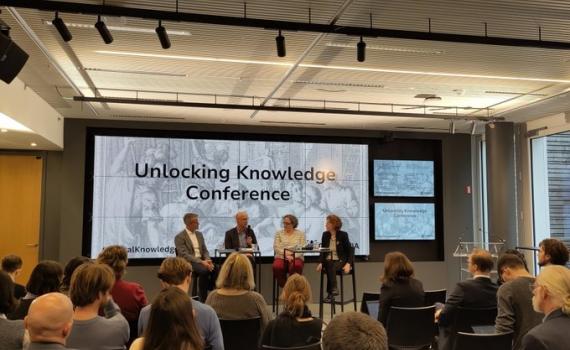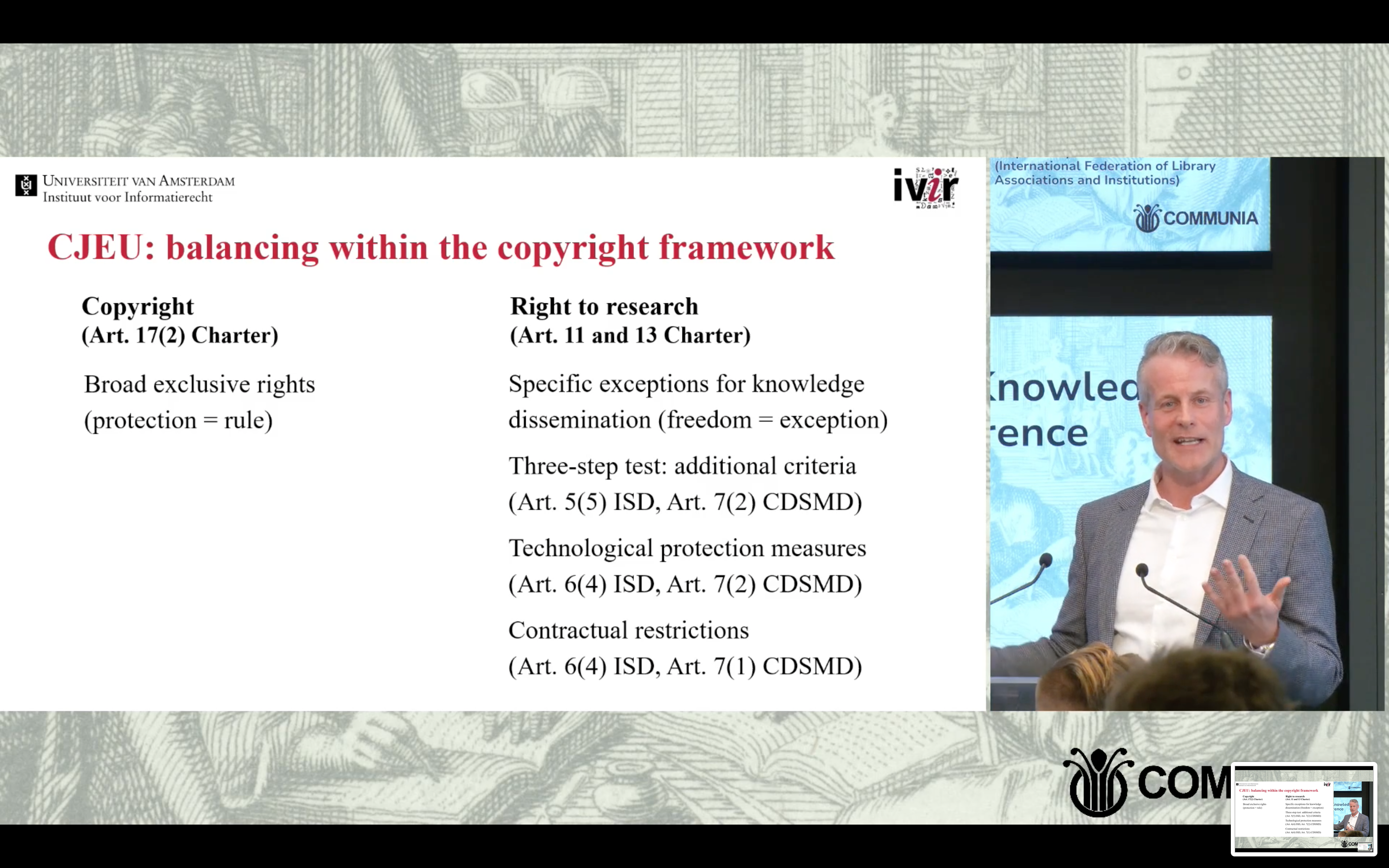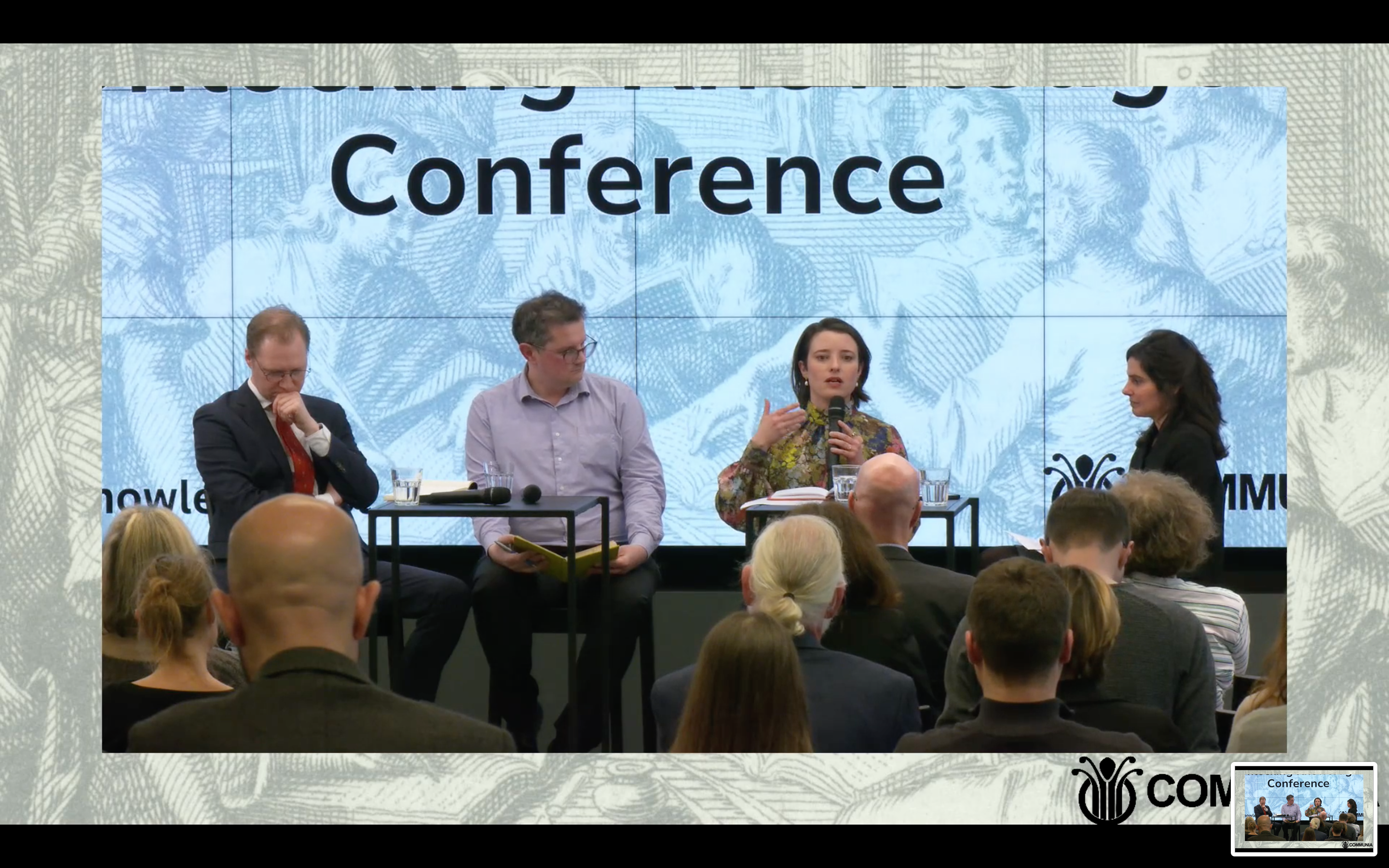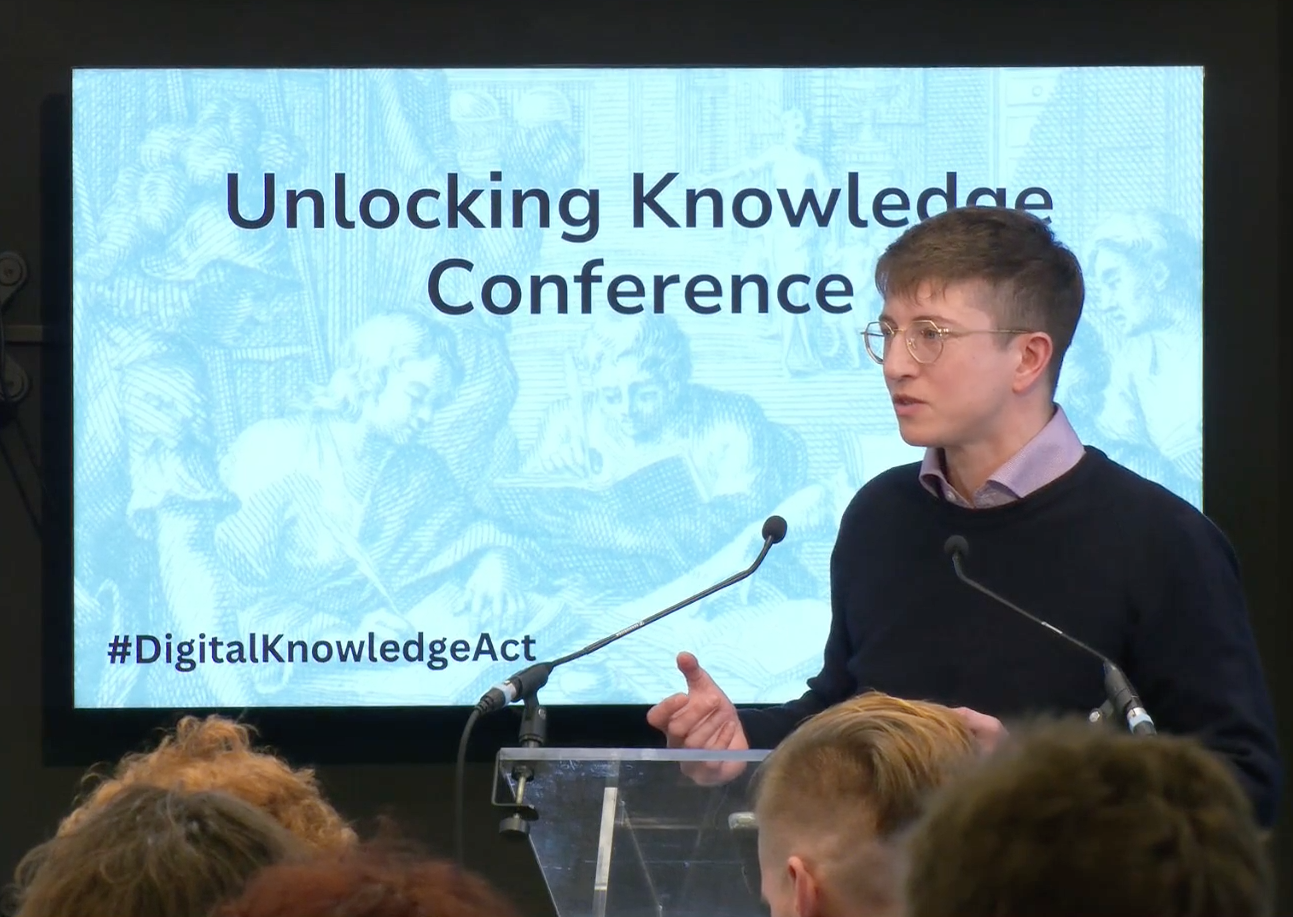
Teresa Hackett, EIFL Copyright and Libraries Programme Manager, reports on a recent conference hosted by COMMUNIA on two important issues that create obstacles to the creation of a flourishing information ecosystem: exposure to legal liability by cultural heritage institutions for use of copyrighted works and refusals by rightsholders to license digital content.
On 6 March 2024, COMMUNIA, an international association based in Europe, hosted a mini-conference in Brussels that brought together a full house of academics, representatives of civil society and EU policymakers to discuss two issues that impede access to knowledge and how to empower libraries, and other knowledge institutions, to play a bigger part in creating a flourishing information ecosystem.
‘Unlocking Knowledge’ featured two high level panels and concluded with a call for a Digital Knowledge Act for Europe.
Panel on legal uncertainty and exposure to liability
I moderated the first panel on the issue of legal uncertainty and exposure to liability for cultural heritage institutions when working with copyright-protected materials. Librarians and other cultural heritage professionals often face questions of legal uncertainty when managing material in their collections, providing information services to students and faculty and undertaking digital preservation projects, for example. In essence, they are asked to apply an area of law that can be complex, where the facts of each case are different, and to make a judgment with potentially significant consequences (legal and reputational), if they get it wrong. How do we empower communities so that legal uncertainties, and fear of litigation, are not impediments to research? How can communities be supported in using copyright exceptions to their full potential, as intended by the legislator?
 Martin Senftleben, Professor of Law, University of Amsterdam kicked off by presenting the legal issues where copyright protection is the rule - European research exceptions (are they sufficiently broad?), the challenges (are the counter-balancing measures sufficiently clear?), the mitigations (some EU case law, and provisions in other jurisdictions, such as the US, that limit liability when a librarian, for example, acts in good faith during the course of her duties).
Martin Senftleben, Professor of Law, University of Amsterdam kicked off by presenting the legal issues where copyright protection is the rule - European research exceptions (are they sufficiently broad?), the challenges (are the counter-balancing measures sufficiently clear?), the mitigations (some EU case law, and provisions in other jurisdictions, such as the US, that limit liability when a librarian, for example, acts in good faith during the course of her duties).
Annabelle Shaw, Copyright and Licensing Manager at the British Film Institute (BFI) shared her experience balancing copyright compliance and risk in mass digitization projects. Factors that are taken into account include the provenance of the work (how was it acquired), the nature of the work (commercial or non-commercial production), level of underlying rights that might be attached to the work (audio-visual works are notoriously difficult in this regard), and how the work will be used once it is digitized. BFI takes a blended approach to risk using copyright exceptions, obtaining licences where needed, and assessing the level of risk (likelihood of being sued by a rightsholder). However smaller institutions with whom BFI works, without the benefit of rights management specialists or access to copyright lawyers, tend to take a very conservative approach to risk. As a result, important works can sometimes be withheld from projects and are therefore not made available online. A limitation on liability would be very helpful as it would provide a security blanket for staff and institutions facing these situations.
Michael Arentoft (Head of Unit, European Commission DG RTD.A.4) highlighted the twin policy context - free circulation of knowledge (Article 179 Treaty on the Functioning of the EU), and the priority action for open science under the European Research Area (ERA) Policy Agenda 2022-2024. He also highlighted the role of the Commission not only as a legislator, but also a policymaker and a funder in helping to unlock knowledge. For example, a Commission Recommendation to member states on access to scientific information (2012) has contributed to a significant increase over the last four years in national policies on open science (from 45% to 70%) and open data (from 15% to 55%). In addition, recipients of Commission-funded research projects are contractually required to retain their rights in order to fulfill open access obligations for project outputs.
A forthcoming study prepared for the Commission on improving access and reuse of research results and data provides the framework for immediate future work by the Commission in this area. The study sets out recommendations on copyright and related rights, including the introduction of a general research exception, the introduction of an EU-wide secondary publication right, and guidance on the application of the text and data mining exception (fuelled by use of AI in science). The Commission will analyze the study to clarify which options will lead to legislative measures and which might result in non-legislative measures (such as policy recommendations).
Panel on refusals by rightsholders to license digital content
The second panel, moderated by COMMUNIA’s Legal Director, Teresa Nobre, looked at another issue that creates obstacles to using digital formats - when rightsholders refuse to license digital content to institutions, such as libraries and educational institutions.
Bernd Justin Jütte, Assistant Professor of Law, University College Dublin presented the preliminary findings of a study on the topic, co-authored with Professor Christophe Geiger, Luiss Guido Carli University (the study was commissioned by COMMUNIA and the IFLA Foundation). From a legal perspective, mechanisms for the enforcement of user rights under copyright law are fragmented and ineffective. But in order for copyright to fulfill its social contract (to provide access to science and culture for citizens) in the digital environment, he argued that rightsowners should have a positive obligation to provide access to digital works for specific purposes under licence terms that are fair and reasonable. In addition, libraries should be granted special affirmative rights, he said. As institutions whose core mission is to make knowledge available to the public, libraries are enablers of knowledge and scientific progress, as well as intermediaries that facilitate access to works so that citizens can in turn exercise their individual rights (such as making a copy of an article for research purposes).
Stephen Wyber, Director of Policy and Advocacy, IFLA followed with examples of how libraries in Europe are refused licences by publishers to access e-books and other digital content. For example, in Germany, purchases by libraries of popular e-titles are subject to ‘windowing’ (whereby certain titles can only be acquired after a certain period of time); in Denmark, only midlist and backlist titles are available to libraries (certain best sellers can’t be obtained); and in the UK, some academic textbooks are not available to institutional libraries at all (they can only be licensed to individuals). These practices affect libraries as we know them - they encroach upon their autonomy to choose and build collections, not in accordance with their missions and the needs of their communities, but determined instead by the dictates of a publisher. They also create a two tier system with privileged access to e-books for those who can afford to buy them. He urged policymakers to ensure that the e-book market works effectively and efficiently for European knowledge institutions that are an essential part of a flourishing knowledge ecosystem.
Danish MEP Karen Melchior, Renew Europe Group agreed that better legislative protections are needed for libraries and librarians. Digitization has not delivered on the promise of universal access to knowledge: while all knowledge in future will be digital, the risk is that large parts will also be inaccessible to whole communities. Librarians and copyright scholars should stop being polite about this situation, she said. The next European Parliament (elections take place in June 2024) will need to be convinced of this huge public interest concern for access to knowledge for education, research and innovation, and she advised dovetailing the arguments with ongoing discussions on the role of big tech platforms in Europe.
A Digital Knowledge Act for Europe
The conference concluded with closing remarks from Felix Reda, COMMUNIA member and former MEP who expressed optimism for future developments in this field. Over the last 10 years, debates concerning research have shifted from damage control (Digital Single Market Directive) to the introduction of important provisions for research and data access (Digital Services Act). However, the needs of researchers and research institutions were never the starting point for these discussions. To place research front and centre in future policy and legislative developments, he called for the introduction of a Digital Knowledge Act. The EU spends a huge amount of money on research (with 30% project overheads) - a single, coherent piece of legislation addressing research needs would ease the legal complexities faced by researchers, reduce bureaucracy complying with complicated legal mechanisms, and allow more time for actual research. COMMUNIA advocates for the introduction of a Digital Knowledge Act, a targeted legislative instrument for knowledge institutions to align and update the legal framework for European research and other public interest activities.
Further information
SHARE / PRINT







